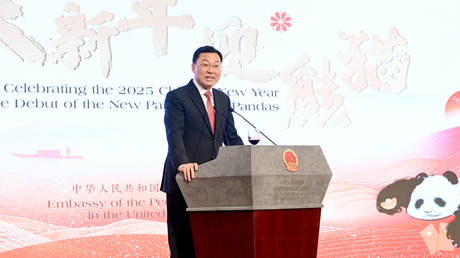ARTICLE AD BOX
AMERICA could be drawn into war as Venezuelan leader Nicolas Maduro looks poised to invade Guyana.
Maduro – a good friend of Russian dictator Vladimir Putin – has ambitions to seize the oil supplies in the mineral-rich Essequibo region.
 AFP
AFP AFP
AFP AP:Associated Press
AP:Associated Press
Venezuela is now pointing its military firmly at its smaller and militarily weaker neighbour Guyana.
It is a regional conflict that could explode right in the US’s backyard, with fears such a dispute could trigger an intervention by Washington.
Maduro is a figure in Putin’s tinpot empire of dictators and despots who want to attempt to unsettle the global order.
He has said he wants the “peaceful rescue” of the region which he described as “de facto occupied by the British Empire”.
And now he has ordered his state-run oil company PDVSA to draw up maps for drilling in the region.
Maduro is also reported to have mobilised his military to Puerto Barima near the border with Guyana.
The Venezuelan president, who has been in power for a decade, got the victory he wanted at the weekend over whether to claim sovereignty over the territory.
In a move branded a “pretext for annexation” by Guyana, electoral authorities said 95 per cent of voters backed establishing a new state in Essequibo.
Just days after the vote, Maduro on Tuesday directed the country’s state-owned companies to immediately begin to explore and exploit the oil, gas and mines in the region.
He also ordered the creation of local subsidiaries of Venezuelan public companies, including oil giant PDVSA and mining conglomerate Corporacin Venezolana de Guayana.
The state companies will “immediately proceed to create the division PDVSA Esequibo and CVG Esequibo and immediately we’ll proceed to give operating licenses for the exploration and exploitation of oil, gas and mines in our Guayana Esequiba,” he said.
Guyanese President Irfaan Ali blasted Maduro’s comments as a “direct threat” against his country, which has been a member of the Commonwealth since 1970.
He had appealed to the International Court of Justice, the United Nations’ top court, which on Friday ordered Venezuela not to take any action to change the status quo until the panel can rule on the two countries competing claims, which could take years.
Ali said Maduro was showing “blatant disregard” for the ICJ ruling.
He added: “Guyana will be reporting this matter early in the morning.
“We will write the UN Security Council and the court.
“The Guyana Defense Force is on high alert… Venezuela has clearly declared itself an outlaw nation.”
But should Maduro invade Guyana, the US could be drawn in.
The State Department is already mulling reimposing sanctions on Venezuela following Sunday’s referendum.
And it was reported that the Guyana military has already contacted the US military about potential support.
Michael Rubin, Senior Fellow at public policy think tank American Enterprise Institute, has urged Joe Biden to send in soldiers now.
He wrote: “Maduro is testing Biden, just as Saddam tested Bush and Galtieri tested Margaret Thatcher.
“If Biden wants to stave off war, now is the time to send American troops to Guyana.
“Sometimes deterrence is necessary if diplomacy is to succeed.”
Although part of the Commonwealth, the association has no military component and the UK would not be obligated to defend Guyana.
The UK may still choose to intervene or assist should Venezuela invade.
Meanwhile, Maduro also announced the creation of a new Comprehensive Defense Operational Zone for the disputed strip, similar to the special military commands that conduct operations in different regions of the country.
The 61,600-square-mile area accounts for two-thirds of Guyana.
Venezuela has always considered Essequibo as its own because the region was within its boundaries during the Spanish colonial period, and it has long disputed the border decided by international arbitrators in 1899, when Guyana was still a British colony.
In recent years Venezuela has reactivated its claim over the territory after the discovery of offshore oil and gas.
The maritime border between the two countries is also in dispute.
Guyana, which is currently producing some 400,000 barrels per day of oil and gas, this year received bids for new shallow water and deep water blocks from local and foreign companies in its first international bidding round.
The exploration licenses for those areas have not been signed.
Maduro is an ally of Russian tyrant Putin, and the Venezuelan leader is expected to visit Moscow.
Venezuela boasts the world’s largest proven oil reserves and Russia is the world’s second largest oil exporter.
The two countries are looking to deepen their cooperation as Russian companies look to invest more in the South American country.
Last year, Maduro assured Putin of his “strong support” in a telephone call following his invasion of Ukraine.
In the call initiated by Caracas, Maduro also condemned “destabilising actions of the United States and NATO” and spoke out against a Western campaign of “lies and disinformation,” the Kremlin said.
 Reuters
Reuters AFP
AFP.png)
 1 year ago
15
1 year ago
15








 English (US)
English (US)